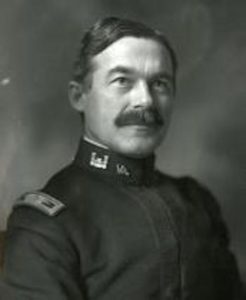
Robert Kerlin
*Robert Kerlin was born on this date in 1866. He was a white-American minister, author, soldier, and activist.
From Harrison County, MO., Robert Thomas Kerlin’s parents were from Kentucky and were owners of several small farms. They raised and sold Berkshire Hog and Southdown Sheep. Confederate properties were seized due to the American Civil War, and his family suffered a considerable loss but retained their land. After his father died in 1874, 8-year-old Kerlin worked the family farms. Attending school part-time, he attained his license to teach at the Albany Public School in 1884.
From 1895 to 1898, he was a minister in the Southwestern Episcopal Church, where he compiled a church hymnal. Kerlin extended his ministry as a chaplain in the military. He served in the Third Missouri Volunteers during the Spanish-American War. As a writer over time, he wrote “The Camp Life of the Third Regiment,” ‘The Voice of the Negro”, “The Church of the Fathers,” “Contemporary Poems of the Negro”, “Theocritus in English Literature” and “Mainly to Myself.”
His higher education pursuits began with the Central College in Fayetteville, MO, in English, Philosophy, and History. He finished his degrees at Harvard and Johns Hopkins Universities by 1906. He was an early influence on the career of Naomi Long Madgett and others. Kerlin was a professor of English at Missouri Valley College, Southwestern University, State Normal School at Farmville, and Virginia Military Institute. After the Reconstruction Era, Black sharecroppers in Elaine, Arkansas, took issue with wage shortages from white businessmen. They also wanted to join the Progressive Farmers and Household Union of America, but neither request was granted. In September 1919, the Elaine Race Riot occurred.
Dr. Kerlin was sensitive to their plight for moral and spiritual reasons, as well as because he had observed the unfair treatment of his family in childhood. He published an “Open Letter to the Governor of Arkansas” in The Nation Magazine. This was because ninety-two Blacks were sentenced to life in prison or death following the riot. Six Blacks were sentenced to death for the riot by Governor Thomas McRae. Dr. Kerlin’s letter urged the governor to “take the matter into his private chamber and give it an hour’s consideration, as before the Eternal Judge.” By quoting the bible, the Magna Carta, and the Bill of Rights, Kerlin hoped to dissuade the governor from executing the prisoners on June 10, 1921. Kerlin was fired for writing and sending this letter.
Despite his termination, Kerlin continued to play a significant role in civil rights in Virginia and the South. After his termination from VMI, Kerlin taught at the State Normal School in West Chester, PA., from 1922 to 1927. Also, during that time, he taught English Literature at the Pennsylvania Labor College and Lincoln University, PA. Dr. Robert T. Kerlin died on March 15, 1950.